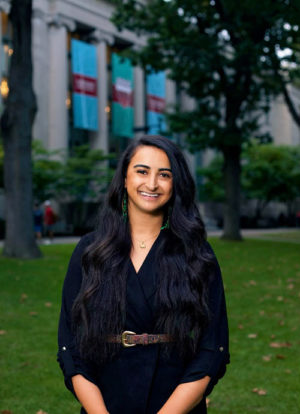[ad_1]
February 16, 2022
By Sarah Foote
On December 8, 2021, Sondra Anton, JD ’22, testified in front of members of the United States House of Representatives at a congressional hearing held by the bipartisan Tom Lantos Human Rights Commission focused on human rights in Sri Lanka. Anton’s testimony focused on efforts to hold state security forces accountable for international law violations against the Tamil population during the final stages of the country’s internal armed conflict in 2008-2009.
Anton relayed information on the crimes and human rights violations committed by the Sri Lankan government and military forces in the last months of the 26-year-long war that ended in May 2009. She recounted how tens of thousands of Tamil civilians were killed during this period in one of the worst humanitarian crises in recent history. Anton also stressed how survivors of these atrocities are still displaced and family members are often met with opposition and threats from the government there while searching for their missing relatives. Her testimony also observed that the same officials accused of orchestrating alleged war crimes and crimes against humanity during this period are back in power today.
Anton first joined the International Human Rights Clinic (IHRC) in Fall 2020. “I came to law school with the specific purpose of pursuing a career focused on seeking justice and accountability in conflict and post-conflict societies. I chose Harvard in large part because of the amazing work that the Clinic had done in this area on behalf of survivors of mass atrocity,” Anton said, specifically citing the IHRC’s involvement in the historic Mamani vs. Sanchez de Lozada and Sánchez Berzaín case, a case that came to the Clinic at the initiative of then student Thomas Becker.
“The Clinic encourages students to take initiative and build expertise in areas that they are passionate about,” said Professor Tyler Giannini, a Director of the IHRC. “Since bringing the Sri Lanka work to the Clinic, Sondra has made a tremendous contribution and driven our efforts forward in this space.”
While providing testimony, Anton noted that the United States should play a larger role in bringing Sri Lankan perpetrators to justice. Anton also identified ways the United States could strengthen its efforts while ensuring survivors’ voices are heard and by taking steps such as collection and preservation of evidence of these crimes. She said that the United States and other international communities must work together to bring the perpetrators to justice and provide important and necessary resources for the survivors.
“There are so many issues facing Sri Lanka today that were highlighted during the panel, such as the frightening rise in anti-Muslim violence and the resurgence of extreme ethno-nationalist violence under the current regime. By specifically addressing state-sponsored impunity for 2009-era crimes from an international human rights and criminal law perspective, my testimony sought to paint a fuller picture to lawmakers and the public about how salient the past is to the present on the island,” Anton said.
Both Anton and Giannini agree that more work needs to be done to help Tamil survivors of mass atrocity in Sri Lanka.
“Law is but one tool that can help recognize the fundamental human dignity that has been repeatedly denied to Tamils by successive Sri Lankan governments since independence,” Anton said in her testimony.
Anton will graduate in May and plans to do a post-graduate fellowship related to international accountability. She says that advances in international criminal law and renewed attention on Sri Lanka at the United Nations, including an increased investigative capacity in international crimes, will hopefully make it harder for Sri Lankan war criminals to run out the clock on justice.
“Whether through platforms like congressional hearings or in a court of law, I plan to use my training as a human rights lawyer to fight to ensure survivors’ calls for truth and justice do not go unanswered,” said Anton.
To read a copy of Anton’s complete statement to Congress click here.
[ad_2]





